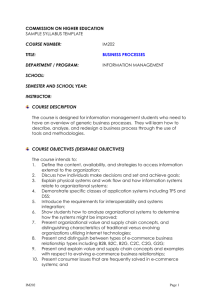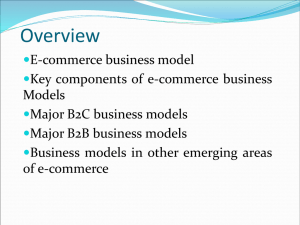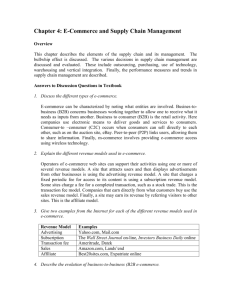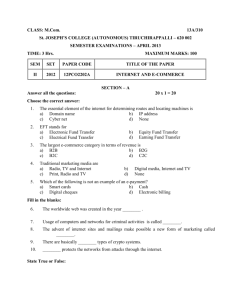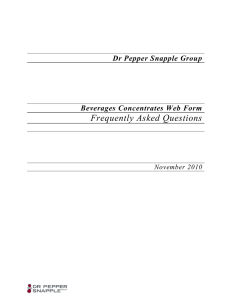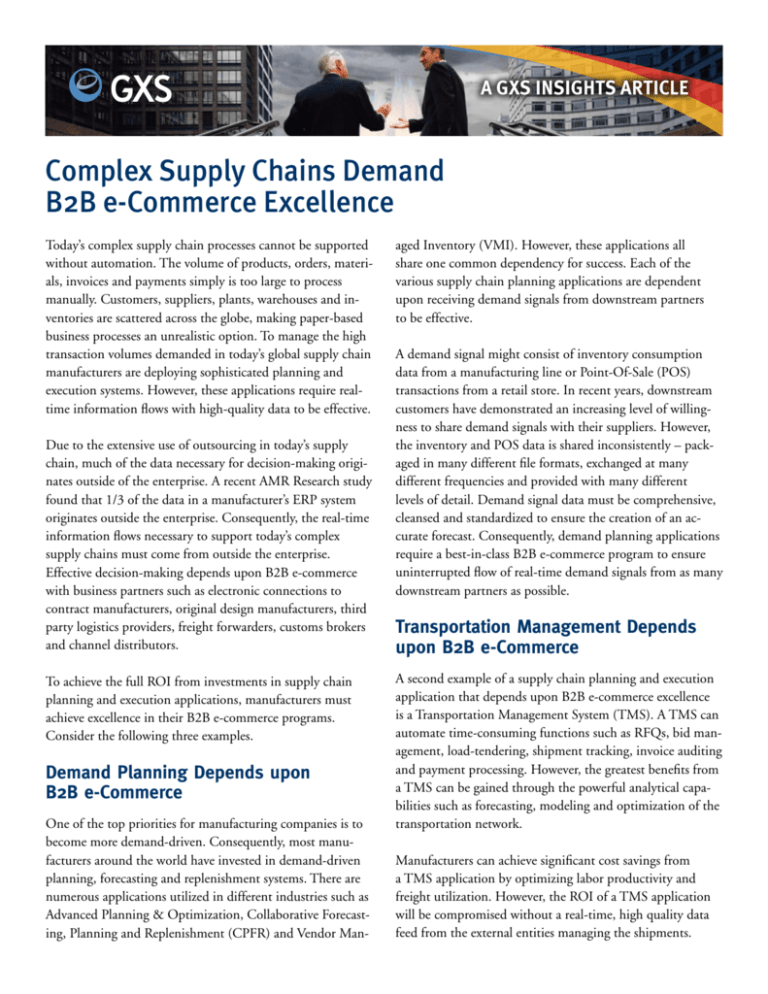
A GXS INSIGHTS ARTICLE
Complex Supply Chains Demand
B2B e-Commerce Excellence
Today’s complex supply chain processes cannot be supported
without automation. The volume of products, orders, materials, invoices and payments simply is too large to process
manually. Customers, suppliers, plants, warehouses and inventories are scattered across the globe, making paper-based
business processes an unrealistic option. To manage the high
transaction volumes demanded in today’s global supply chain
manufacturers are deploying sophisticated planning and
execution systems. However, these applications require realtime information flows with high-quality data to be effective.
Due to the extensive use of outsourcing in today’s supply
chain, much of the data necessary for decision-making originates outside of the enterprise. A recent AMR Research study
found that 1/3 of the data in a manufacturer’s ERP system
originates outside the enterprise. Consequently, the real-time
information flows necessary to support today’s complex
supply chains must come from outside the enterprise.
Effective decision-making depends upon B2B e-commerce
with business partners such as electronic connections to
contract manufacturers, original design manufacturers, third
party logistics providers, freight forwarders, customs brokers
and channel distributors.
To achieve the full ROI from investments in supply chain
planning and execution applications, manufacturers must
achieve excellence in their B2B e-commerce programs.
Consider the following three examples.
Demand Planning Depends upon
B2B e-Commerce
One of the top priorities for manufacturing companies is to
become more demand-driven. Consequently, most manufacturers around the world have invested in demand-driven
planning, forecasting and replenishment systems. There are
numerous applications utilized in different industries such as
Advanced Planning & Optimization, Collaborative Forecasting, Planning and Replenishment (CPFR) and Vendor Man-
aged Inventory (VMI). However, these applications all
share one common dependency for success. Each of the
various supply chain planning applications are dependent
upon receiving demand signals from downstream partners
to be effective.
A demand signal might consist of inventory consumption
data from a manufacturing line or Point-Of-Sale (POS)
transactions from a retail store. In recent years, downstream
customers have demonstrated an increasing level of willingness to share demand signals with their suppliers. However,
the inventory and POS data is shared inconsistently – packaged in many different file formats, exchanged at many
different frequencies and provided with many different
levels of detail. Demand signal data must be comprehensive,
cleansed and standardized to ensure the creation of an accurate forecast. Consequently, demand planning applications
require a best-in-class B2B e-commerce program to ensure
uninterrupted flow of real-time demand signals from as many
downstream partners as possible.
Transportation Management Depends
upon B2B e-Commerce
A second example of a supply chain planning and execution
application that depends upon B2B e-commerce excellence
is a Transportation Management System (TMS). A TMS can
automate time-consuming functions such as RFQs, bid management, load-tendering, shipment tracking, invoice auditing
and payment processing. However, the greatest benefits from
a TMS can be gained through the powerful analytical capabilities such as forecasting, modeling and optimization of the
transportation network.
Manufacturers can achieve significant cost savings from
a TMS application by optimizing labor productivity and
freight utilization. However, the ROI of a TMS application
will be compromised without a real-time, high quality data
feed from the external entities managing the shipments.
2 • Complex Supply Chains Demand B2B e-Commerce Excellence
A GXS Insights Article
External providers might include service companies such as
3PLs, freight forwarders, customs brokers, consolidators and
transportation carriers such as ocean, rail, air, truckload and
less than truckload freight operators.
Logistics providers and transportation carriers have varying
B2B e-commerce capabilities. Many are small businesses with
less sophisticated technology capabilities that do not include
support for EDI or XML data exchange. Others are larger
service providers and carriers, which do support EDI-based
document exchange. However, the logistics industry is somewhat notorious for low-levels of data quality, particularly
from the larger carriers. To achieve the optimal ROI from a
TMS application requires a best-in-class B2B e-commerce
program. The B2B platform should provide low-cost, easyto-use mechanisms for small carriers to conduct e-commerce.
Furthermore, it should provide data cleansing services to
minimize exception processing in the TMS. Ideally, B2B
e-commerce should provide an uninterrupted flow of shipment information from logistics providers and transportation
carriers directly into the TMS to enable real-time, centralized
decision making.
Supply Chain Finance Depends upon
B2B e-Commerce
Specifically, the ability to process an invoice electronically
is a key factor in whether an early payment discount can be
obtained by the buyer.
The process works as follows. Once a buyer approves an invoice for payment, the A/P organization approaches the supplier with an option to be paid early in exchange for a small
fee. However, a critical foundation to Supply Chain Finance
is the ability to exchange electronic invoices in a standardized
format such as EDI or XML. Invoices sent via post or e-mail
for example, can delay the approval cycle by 5-10 days due to
the manual workflow required.
Typically, the suppliers most in need of the funds are the
smallest companies with least available credit facilities.
Unfortunately, these small suppliers are also the ones with
the least sophisticated technology environments which rarely
support e-invoicing. Strong B2B e-commerce capabilities
within the supply chain community are a critical foundation
necessary for managing complex financing programs. Ideally,
a B2B e-commerce program would provide low-cost, easy-touse options for small businesses to create electronic invoices.
The result will be a high percentage of invoices available for
early payment and financing, which frees up working capital
in the supply chain.
The economic recession placed a premium on cash reserves
for many large corporations. Many of the world’s largest
companies have extended payment terms from averages of
45 days to in some cases over 90. The result has been a
considerable working capital challenge for suppliers of these
large corporations. New programs such as Supply Chain
Finance can alleviate many of the suppliers’ cash flow
concerns by offering accelerated payments in exchange for
a nominal discount. However, the process depends upon
rapid exchange of information, specifically invoicing details,
between all three parties—buyer, supplier and financier.
North America and
Global Headquarters
9711 Washingtonian Blvd.
Gaithersburg, MD 20878, US
+1-800-560-4347 t
+1-301-340-4000 t
+1-301-340-5299 f
www.gxs.com
Europe, Middle
East and Africa
18 Station Road
Sunbury-on-Thames
Middlesex TW16 6SU
United Kingdom
+44 (0)1932 776047 t
+44 (0)1932 776216 f
www.gxs.eu
Asia Pacific
About GXS
GXS is a leading provider of B2B e-commerce solutions and operates the world’s largest and most expansive network of integrated business
communities. The company’s software and services simplify and enhance businesses process integration and collaboration among networks of
trading partners. Organizations worldwide, including more than 75 percent of the Fortune 500, use GXS solutions to extend their supply chain
networks, optimize product launches, automate warehouse receiving, manage electronic payments and gain supply chain visibility. Based in
Gaithersburg, Maryland, GXS has operations and offices around the world. For more information, see http://www.gxs.com, http://blogs.gxs.com
and http://twitter.com/gxs.
© Copyright 2010 GXS, Inc. All Rights Reserved. December 2010 A
Room 1609-10
16/F China Resources Building
26 Harbour Road, Wanchai
Hong Kong
+852 2884-6088 t
+852 2513-0650 f
www.gxs.asia.com

